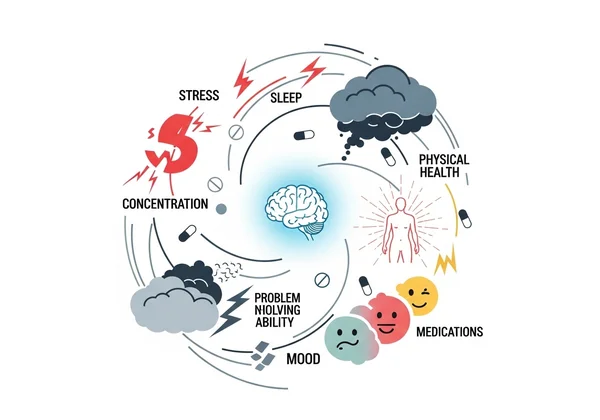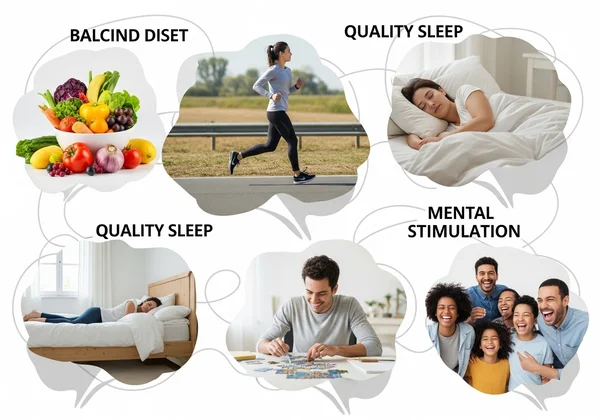Low Score on Cognitive Test? Your Next Steps Guide
October 30, 2025 | By Audrey Fletcher
Receiving a lower-than-expected score on a cognitive test can be unsettling, sparking a wave of questions and concerns. This reaction is completely natural. This guide is here to walk you through that feeling, transforming anxiety into understanding and action. A single score isn't a final verdict on your brain health; it's a starting point—a valuable piece of information on your wellness journey. Instead of a cause for alarm, view it as a signpost guiding you to a deeper understanding of your unique cognitive profile. Let's explore what your results mean and the actionable steps you can take. The first step is to understand your results.

Understanding Your Cognitive Test Results
Before jumping to conclusions, it's crucial to interpret your cognitive test score correctly. It’s more nuanced than a simple pass or fail—think of it as a snapshot of your brain's performance on a specific day, under specific conditions.
What Do Cognitive Test Scores Really Indicate?
A cognitive test score is a quantitative measure of your performance on standardized tasks designed to assess various cognitive domains, like memory, attention, executive function, and processing speed. Our comprehensive assessment platform evaluates 22 distinct cognitive skills to provide a complete view. A score indicates your performance compared to a baseline, often established from a large group. It highlights potential strengths and areas needing more attention, but it doesn't define your intelligence or future. It's a data point for understanding your brain health.
Factors That Can Influence Your Performance
Your cognitive performance isn't static; it can fluctuate daily. Several temporary factors can significantly impact your test results, and it's important to consider them before worrying about a low score. These can include:
- Stress and Anxiety: High levels of stress can temporarily impair memory and focus.
- Lack of Sleep: A poor night's sleep is one of the biggest culprits behind reduced cognitive function.
- Mood: Feeling down or depressed can slow down your thinking and affect your motivation to perform well.
- Physical Health: Illness, fatigue, or even dehydration can impact your ability to concentrate.
- Medications: Certain medications can have side effects that influence cognitive clarity.
Recognizing these variables is key. A low score might simply reflect a bad day, not a long-term decline. This is why establishing a baseline and monitoring changes over time is so valuable. You can always take our cognitive test again under different circumstances to see if your score changes.

Why a Screening Test Isn't a Diagnosis
This is perhaps the most critical point to understand. An online cognitive assessment tool like ours is a powerful and scientifically validated screening instrument, not a diagnostic one. A screening test is designed to identify individuals who might benefit from further evaluation. It flags potential issues and provides valuable insights, but it cannot and should not be used to self-diagnose conditions like dementia, Mild Cognitive Impairment (MCI), or ADHD. A formal diagnosis can only be made by a qualified healthcare professional, such as a neuropsychologist or neurologist, after a comprehensive clinical evaluation.
What to Do After Receiving a Low Score
Okay, so you've taken the test and the score is concerning. Let's focus on a clear, actionable plan. This is where you move from worrying to taking control of your cognitive health journey.
Reviewing Your Report for Insights
Your comprehensive report from your cognitive test is your most valuable asset right now. Don't just focus on the overall score. Dive deeper into the breakdown of the 22 cognitive skills assessed. Where did you excel? Which specific areas were challenging? For instance, you might discover that your long-term memory is excellent, but your working memory or processing speed is lower. This detailed profile provides specific insights that are far more useful than a single number. Understanding these patterns is the first step toward targeted improvement and informed discussions with professionals.
When to Seek Professional Medical Advice
While a single low score isn't a diagnosis, it can be a prompt to seek professional guidance, especially if you've been experiencing persistent symptoms in your daily life. Consider scheduling an appointment with your doctor if:
- You’ve noticed a consistent decline in memory, problem-solving, or other cognitive skills.
- Cognitive challenges are interfering with your work, social life, or daily tasks like managing finances.
- Family members or close friends have expressed concern about changes they’ve observed.
- You have a family history of dementia or other neurological conditions.
A professional can help rule out underlying and often treatable causes for cognitive changes, such as vitamin deficiencies, thyroid issues, or medication side effects.
Preparing for Your Doctor's Appointment
To make your appointment as productive as possible, go prepared. Your doctor will appreciate having clear, specific information. Here’s a checklist:
-
Bring Your Report: Print out your detailed cognitive test report. It provides objective data for your doctor to review.
-
List Specific Examples: Instead of saying "my memory is bad," provide concrete examples. For instance, "I've forgotten two appointments this month" or "I have trouble following conversations."
-
Note Your Symptoms: Write down when the symptoms started, how often they occur, and if anything makes them better or worse.
-
List All Medications: Include all prescription drugs, over-the-counter medications, and supplements you are taking.

Beyond the Score: Proactive Steps for Brain Health
Regardless of your score, adopting a brain-healthy lifestyle is one of the most empowering actions you can take. Think of this as investing in your cognitive future. The science is clear: lifestyle choices have a profound impact on brain health.
Lifestyle Strategies for Cognitive Support
You don't need a complete life overhaul. Small, consistent changes can make a big difference over time. Focus on these key areas:
- Balanced Diet: A diet rich in fruits, vegetables, whole grains, and healthy fats (like the Mediterranean diet) has been linked to better cognitive outcomes.
- Regular Physical Activity: Aim for at least 150 minutes of moderate-intensity exercise per week. Aerobic exercise, in particular, increases blood flow to the brain.
- Quality Sleep: Prioritize 7-9 hours of quality sleep per night. Sleep is when the brain consolidates memories and clears out toxins.
Engaging in Mental Stimulation and Social Connection
Your brain thrives on novelty and connection. Keep it active and engaged to build cognitive reserve—your brain's ability to withstand challenges.
- Challenge Your Mind: Learn a new skill, take up a hobby, read books, or do puzzles. The key is to engage in activities that are both enjoyable and mentally demanding.
- Stay Socially Active: Meaningful social connections are incredibly protective for the brain. Make time for friends and family, join a club, or volunteer. These interactions challenge your brain in complex ways.
Embracing these positive changes can feel empowering. A great way to start is to get your free report to establish a baseline.

Empowering Your Cognitive Journey: Clarity and Action
Receiving a low score on a cognitive test can feel like a setback, but it's more accurately a setup for a comeback. It’s an opportunity to become an active participant in your own brain health. By understanding what the score means, recognizing influencing factors, and knowing when to seek professional advice, you replace fear with knowledge. By adopting proactive lifestyle changes, you replace uncertainty with empowerment.
Your cognitive journey is unique to you. A test score is just one stop along the way. Use it as a tool for insight, a catalyst for positive change, and a motivator to prioritize your brain’s well-being. The path forward is one of clarity and action, and you are fully equipped to walk it. Ready to begin? Start your test now and take the first step.
Frequently Asked Questions About Cognitive Test Scores
What does a "low score" on a cognitive test truly signify?
A "low score" is a data point suggesting that your performance on specific cognitive tasks was below the average for your demographic group. It's not a diagnosis. It signifies an area that may warrant further attention, monitoring, or discussion with a healthcare provider. It could be influenced by temporary factors like stress or sleep, so it's best viewed as a snapshot in time.
What is generally considered a "good" cognitive test score?
There is no universal "good" score. Scores are typically interpreted in the context of normative data, which compares your performance to others of a similar age and education level. A "good" score is one that falls within the average range for your group and, more importantly, remains stable over time. The goal is to establish your personal baseline and monitor for significant changes.
Should I re-take the cognitive test after receiving a low score?
Yes, re-taking the test can be very helpful. We recommend waiting a few weeks or months and taking it again when you are well-rested and calm. This helps determine if the low score was due to a temporary factor or if it reflects a more consistent pattern. Using the cognitive assessment test periodically allows you to track your cognitive health over time, which is far more insightful than a single result.
Are there immediate steps I can take to support my brain health?
Absolutely. You can start today by focusing on simple, impactful habits. Ensure you get a good night's sleep, go for a brisk walk, choose a healthy meal, and connect with a friend or loved one. Even small, positive actions can contribute to better brain function and overall well-being.